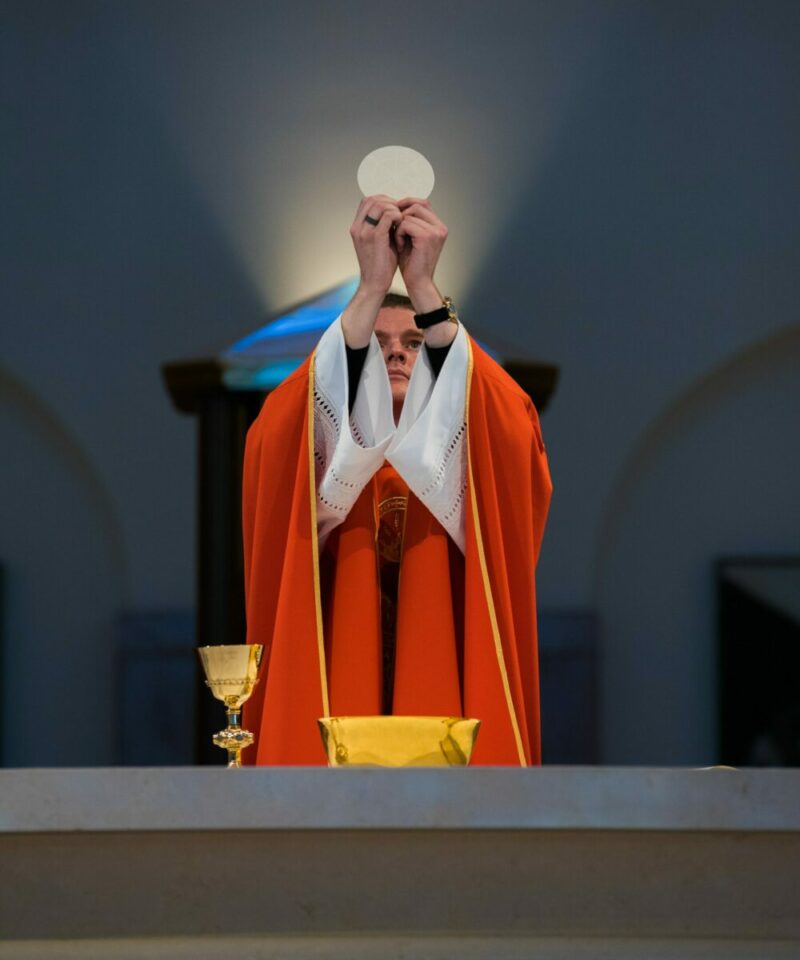The following is my own reflection - it is not endorsed by any institution and is presented as fodder for critical thought.
I am no stranger to stretching the boundaries of sound theological teaching. In fact, I rather relish the idea of expanding my own thoughts well beyond their limits. It is, after all, how we grow and learn. Sometimes I fall flat on my face, get up off the ground, brush myself off, and start again. Other times I soar through the sky with the birds where no one else dares fly. Many wanderings come from someplace, some territory where I am unfamiliar and yet I feel comfortable sharing what I see, feel, or hear. This, then, is no different.

The Church teaches that there are seven (7) sacraments: Baptism, Reconciliation, Eucharist, Confirmation, Matrimony, Holy Orders, and Anointing of the Sick. But what if I told you in truth there is only one sacrament and it is the cornerstone for all the other "celebrations"? Yes, I called them celebrations! Would you feel threatened? Perhaps just a bit challenged? Maybe you just want to slap the stupid out of me and call me a heretic? Frankly, I'd be happy with any of those, but hear me out and let's journey to a much more simple time when our Christ walked this hallowed ground and taught others how to live good lives.
Can we all agree that the sacraments are special celebrations that impart God’s divine grace in some way, shape, or form; and are, for all intents and purposes, celebrations of specific markers within a person's church or religious life? Baptism, for example, is the first step in a lifelong journey of commitment and discipleship as a follower of Jesus, the Christ (remember folks – Christ is not a last name; it is a title). Baptism is the imparting of God’s grace to the person, no matter whether just born or roamed on this earth for a time, so that the person is aware of their greater connection not only to God but to the larger community of faithful. But why? Why do we even bother to baptize? How is this an imparting of grace or consecration of an element? Prior to Jesus being baptized, John was “purifying” people as a way to prepare for God’s gift to the world – it was a symbolic gesture that helped people turn away from lives of sin. It was the turning over of a new leaf. An oversimplification? Perhaps, but not at that time - that's how it was explained in the Bible!!! Remember?!?!
Okay, let’s think about reconciliation for a moment. This has been something deeply personal and weighty for me. You see, I always thought it was easy to forgive others – and I’ve had a great deal of practice in the past 30-some years of ministry. But it isn’t easy at all. Reconciliation is defined as having three elements: conversion of the spirit – that moment when we recognize that we have hurt others or ourselves through some action in which we engaged, confession – being able to vocalize our transgression, and finally celebration – the act of moving away from the hurt we have caused towards healing and change. But how can I forgive someone who doesn’t even think they’ve done wrong? How do we forgive those who continue to defame us? Do we only forgive because we are told to do so? So how is this, also, a consecration of form and matter? Is grace imparted if the three parts aren't complete?
But forgiveness is another sacrament that involves a genuine and almost perfect love. In order to forgive, we must enter into a sort of relationship with the other individual. For those who ask for forgiveness, there is a deeper connection – a purification between those involved. Genuine forgiveness requires us to love unconditionally and let go of our anger or grief. Forgiveness draws us closer to our Father in Heaven who forgives us through His own love. And because of love, our sins, too, have been forgiven through the Holy Sacrifice of our Lord on the Cross. I'm beginning to sense a theme here. But let's keep going to test out the premise.
Confirmation! This has to be a Sacrament - right? Well, this is another initiation rite where we, the confirmands, decide to enter into a much deeper relationship with our Creator. In a sense, this is a pre-marriage with God. Sure, many teenagers are seemingly “forced” into doing what they are instructed by their parents, but ultimately it is a connection of the heart between us and our God. It is the day we announce to not only our community but to ourselves that we WANT this relationship with God. Now, forgive me (pun intended), that truly sounds like the very definition of love?
Now we come to the ultimate proof, and I’m hoping that with the Eucharist - the truest form of sacrificial love - we can begin to understand that love is at the very center of this celebration. If it wasn’t for God’s love, we wouldn’t have this sacrament at all. We would be still killing goats and doves in an attempt to garner favor with the divine through bejeweled priests in the temple. “For God so loved the world, that he gave his only begotten Son, that whosoever believe in him should not perish, but have everlasting life.” How can that be anything other than love – it’s in the scriptures!
And let's not forget, even Abraham was so in love with God that he was willing to sacrifice his son Isaac. When we take the sacred host into ourselves, we are reminding ourselves of that love and of our own forgiveness (remember reconciliation?), and even God's grace. Yes, love in this case, too, is a Sacrament.

Regarding the Celebration of the Eucharist – I remember many a time in seminary where priests would often act as if the celebration was a burden on them. Many tried to use their “get out of jail free” cards by expressing that the mass was an antiquated notion that needed to be replaced – the sooner the better. One even went so far as to defame the celebration from the pulpit. In the halls, I would hear other priests who did enjoy the celebration say, “I have to go do mass now”, or something similar. But this is a topic for another time.
Marriage and Holy Orders are pretty much one and the same – they are both commitments of the heart – at least I hope so. No, wait, today they are matters of convenience for some. Some enter into marriage because it makes good financial sense. Others enter into Holy Orders for similar reasons or because they have been rejected by too many potential mates. No love there – right? WRONG! These two celebrations have EVERYTHING to do with love for there even to be the slightest of considerations for union.
Finally, we have Anointing of the sick, which is perhaps the greatest expression of love one could ever offer to another human being. To allow ourselves to exist so completely in another person's suffering, offering only comfort and grace, draws us into the depths of servitude, and can only be done if we truly submit ourselves not only to the Love of God but to our fellow suffering human companion. No matter whether the suffering is physical, mental, or spiritual; we embrace our own fear and mortality to give solace to another. I know of no other or greater expression that allows us to enter into a more perfect union with the Divine than the sacrament of healing (other than the Eucharist of course).
“The message you heard from the very beginning is this: we must love one another.” (1 John 3:11)
“And now I give you a new commandment: love one another. As I have loved you, so you must love one another.” (John 13:34)
There is no escaping that we express one sacrament, Love, through seven individual, yet closely connected celebrations. Yes, we do celebrate seven public and private expressions of our faith, which we call sacraments, but ultimately they are entrusted to us through God’s love – the single-most perfect sacrament.
If nothing else, I hope this stretch of the mind imparts a renewed vigor to our celebrations. I hope it revives and rejuvenates us as we march on in our service to the People of God through our call to lead others to God’s grace.
Peace be with you.
